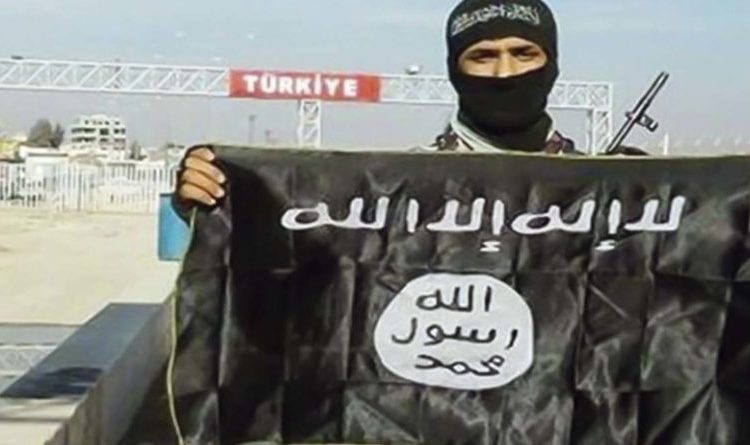The government of Turkish President Recep Tayyip Erdoğan rebuffed parliamentary inquiries posed by opposition lawmakers who questioned alleged links between Islamic State in Iraq and Syria (ISIS) fighters and government agencies, including Turkey’s National Intelligence Organization (MİT), which is accused of facilitating the movement of jihadists at home and abroad by many local and international observers, turning NATO member Turkey into a sanctuary for ISIS and other jihadist groups.
Opposition deputies who submitted written parliamentary questions about ISIS-related claims that mostly appeared on critical media outlets or requested official information on ISIS fighters’ presence in Turkey were disappointed by the government’s silence.
A Nordic Monitor review of parliamentary records shows that a total of 40 written questions out of 43 on ISIS have gone unanswered since December 2016 despite a Turkish law which requires that the government respond to such questions within two weeks. The only answers provide insignificant details that are not relevant to the crux of the questions, suggesting that the government is deliberately ignoring parliamentary inquiries on ISIS.
The review shows the former and last prime minister of Turkey Binali Yıldırım, Interior Minister Süleyman Soylu and Vice President Fuat Oktay have received the majority of questions. Yıldırım interestingly did not answer a single question out of 13 addressed to him.

The most crucial questions were apparently based on a Nordic Monitor story published on September 3, 2019 revealing that İlhami Balı, the mastermind behind the deadliest terror attack in Turkey’s history, killing 105 civilians, had been working with MİT. The story included the location, date and names of MİT agents who met with Balı in Ankara in 2016 when he was one of the most wanted men in Turkey and had been put on the red list by the Turkish police. Three deputies from the main opposition Republican People’s Party and the pro-Kurdish Peoples’ Democratic Party asked Oktay and Soylu whether the claim was true or not. Neither Oktay nor Soylu answered the questions. MİT as expected neither confirmed nor denied the report; however, it would have been more than willing to respond had it been fake news.
Most unanswered questions concerned two Turkish soldiers captured in Aleppo in 2015. ISIS released a graphic video showing two soldiers being burnt alive by ISIS fighters, deeply shocking the Turkish people in 2016. Following the release of the video, Turkey restricted access to the Internet as only a few media outlets had published the story. Despite an urgent inquiry from the opposition, the Ministry of Defense only said that the authenticity of the video was being investigated. Defense Minister Fikri Işık merely confirmed that three soldiers were ISIS captives. Then-Prime Minister Yıldırım refused to reply to any of the written inquiries questioning the authenticity of the ISIS video in the same way that President Erdoğan maintained his silence.

The General Staff only said it had lost contact with three of its conscripts and was checking the authenticity of the footage. However, a year after the incident, military officers reportedly visited one of the families of the soldiers and confirmed his death in northern Syria, saying that the military was searching for his remains.
Contradictory statements from Turkish officials regarding the number of ISIS prisoners in Turkey were the subject of the last parliamentary question in December 2019. Lawmaker Saruhan Oluç of the HDP asked Vice President Oktay what the official statistics on ISIS prisoners in Turkey and ISIS fighters from Turkey were, recalling President Erdoğan’s remarks that there were 5,500 ISIS prisoners behind bars in Turkey, which was almost five times the number previously announced by the Justice Ministry. Nordic Monitor reported on the discrepancy in statistics of ISIS fighters and prisoners in detail shortly before the parliamentary question was submitted. It is no secret that Turkish security agencies failed to take proper action against the flow of ISIS fighters and their activities that were centered mainly in İstanbul and bordering provinces despite pressure from the international community.
Interior Minister Soylu unexpectedly replied to a parliamentary question in January 2019, asking whether a most-wanted suspect, Nusret Yılmaz, who was involved in the Ankara attack in 2015, entered Turkey from Georgia through the border gate at Artvin following his extradition from Georgia. The question also claimed that the suspect reportedly was not detained. Soylu replied that there was only a name similarity and that the person who entered Turkey was another Nusret Yılmaz who had nothing to do with ISIS.
The Turkish constitution and the parliamentary bylaws actually require that written questions be answered within a period of 15 days. Official statistics show that the Turkish government replied to only 10 percent of the written questions after Turkey in 2016 adopted a powerful executive presidential system that weakened parliament’s role. President Erdoğan has the authority to issue decrees on a variety of subjects without parliamentary approval. Political observers claim that there is no longer any parliamentary control in Turkey that would protect citizens from an abuse of power.












